27 Ruling Your Future
In 2005, the scientist and engineer Phil Bourne starting publishing a series of articles which distilled people’s hard won knowledge into Ten Simple Rules. (Bourne 2005) Over a decade more than 1000 rules were published in over 100 articles in the scientific journal PLOS Computational Biology. (Bourne et al. 2018) These articles offer a huge range of advice from making the most of a summer internship (Aicher et al. 2017) to teaching programming (N. Brown and Wilson 2018) and even winning a Nobel Prize. (Roberts 2015) Articles as lists, or “listicles” as they are sometimes known, are a convenient way to summarise key points. So here are Ten Simple Rules for Coding Your Future: the too long, didn’t read (TL;DR) summary of this guidebook.
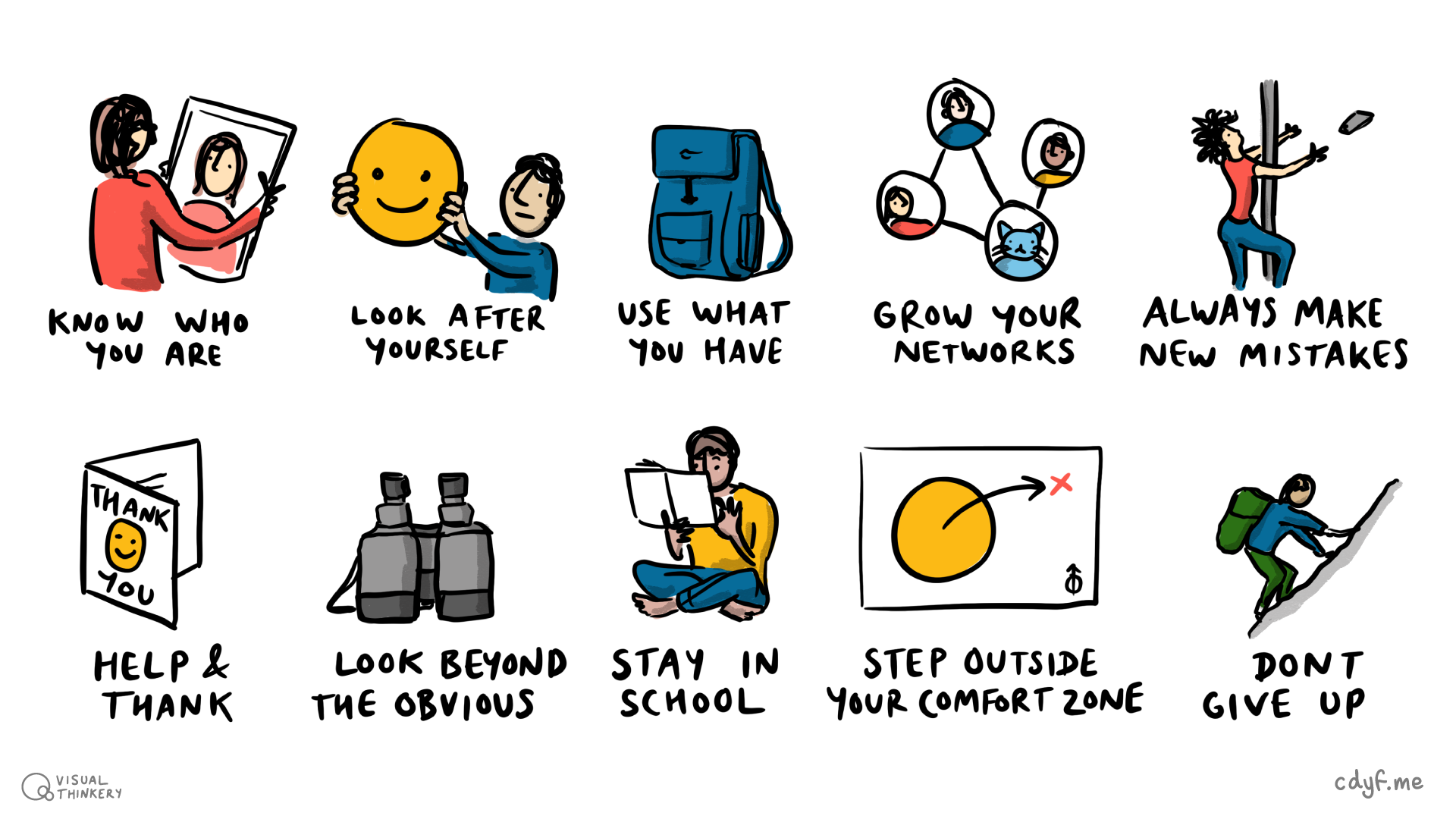
Figure 27.1: Ten Simple rules for coding your future. Know who you are, look after yourself, use what you have, grow your networks, always make new mistakes, help and thank, look beyond the obvious, stay in school, step outside your comfort zone and (most importantly) don’t give up! Figure by Visual Thinkery is licensed under CC-BY-ND
Your future is bright, your future needs ruling, so let’s start ruling your future.
- 🧠 Know who you are, “know thyself”, it worked for the ancient greeks, it can work for you too see section 27.1
- 🙂 Look after yourself, mentally and physically. Job hunting can make you stressed, depressed and exam obsessed, see section 27.2
- 🛠 Use what you have, rather than focusing on the things you don’t have. More time, resources, experience, projects, better grades etc see section 27.3
- 🌐 Build your networks: it’s not what you know, it’s who you know, see section 27.4
- ❌ Always make NEW mistakes, mistakes can be a good thing, see section 27.5
- 🙏 Help and thank, simple gratitude and kindness are good for your mental health and those around you too see section 27.6
- 🔎 Look beyond the obvious, if you still haven’t found what you’re looking for, consider broadening your search, see section 27.7
- 🎓 Stay in school, learning is a life-long process that continues long after you graduate see section 27.8
- 🛋 Step outside your comfort zone. Yes it’s uncomfortable but that’s often where you’ll learn the most, see section 27.9
- 🚦 Don’t give up because being stuck is temporary. Either those red lights will eventually go green or you’ll find a better route, see section 27.10
27.1 Know who you are
There is a lot more to you than your degree. There is a lot more to you than your grades. Yes, you’ve spent (or will be spending) three or four years getting your degree. Use this time to identify your weaknesses and work out how to improve them. Exploring your future depends on knowing who you are now, see chapter 2 and figure 27.2.
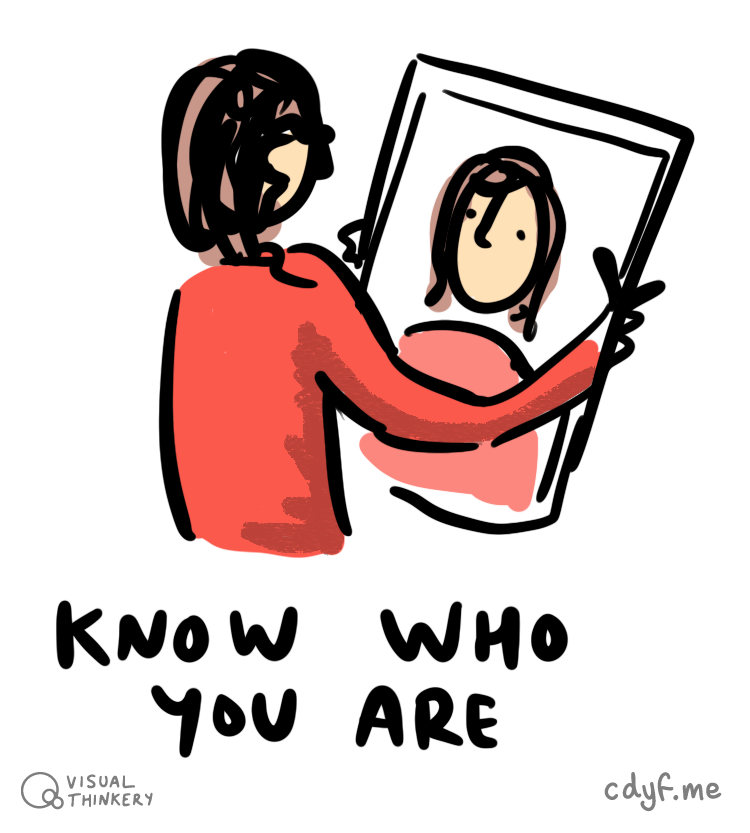
Figure 27.2: How well do really you know yourself? Know who you are sketch by Visual Thinkery is licensed under CC-BY-ND
Being able to articulate your self-awareness to employers will make writing a CV (chapter 8) and interviewing (chapter 13) a lot easier. Both rely on you be able to express yourself in written and spoken language. You should aim to strike a balance between humbly underselling yourself (see section 11.4.6) and proudly overselling yourself, see section 11.4.5. If you have digital profiles like those described in section 11.3.4, how accurate a reflection of you are they? Is your digital alter ego at odds with reality?
27.2 Look after yourself
Studying at University can be enjoyable but it can also make you stressed, anxious and depressed. If you neglect to look after yourself mentally and physically, things can start to fall apart. Choose your reference points carefully, try not to compare yourself to the person at the top of the class: see Carmen’s advice in chapter 45. Ask yourself, am I doing better than last time? Be kind to yourself because nurturing yourself now will nurture your future, see chapter 3.
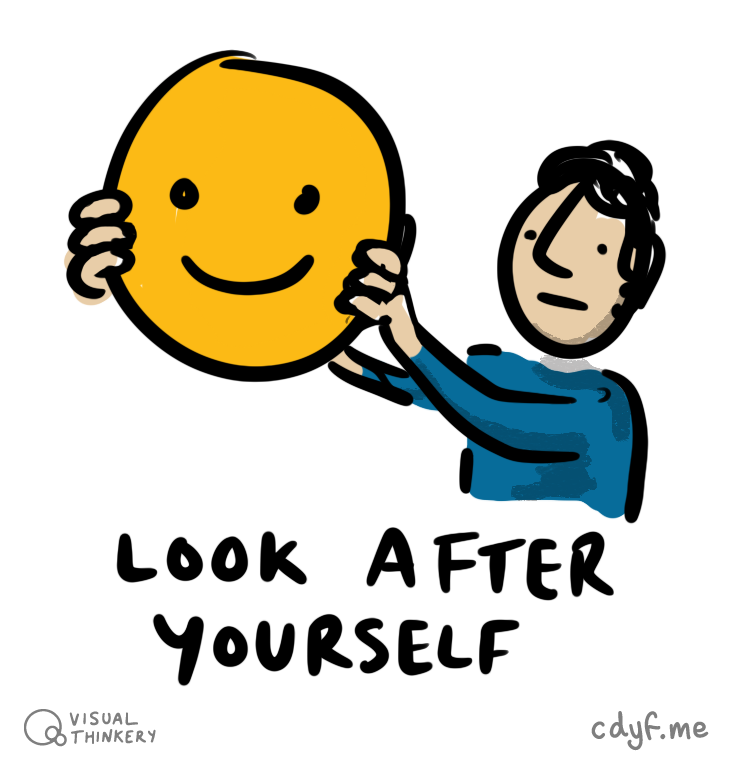
Figure 27.3: It’s important not to neglect your body, mind and soul when you’re working hard. Look after yourself by Visual Thinkery is licensed under CC-BY-ND
At University, you are quite likely to be surrounded by people who have more experience, better knowledge, higher grades or more skills than you. That might not have been the case at high school if you were top (or near the top) of your class. While it is natural to compare yourself to the best, you should do so with caution. The important thing is that you are working to towards the best version of yourself, not necessarily the best in your class anymore.
27.3 Use what you have
It’s too easy to fall into a trap of thinking if only I had better … when job hunting. Use what you already have, see figure 27.4.
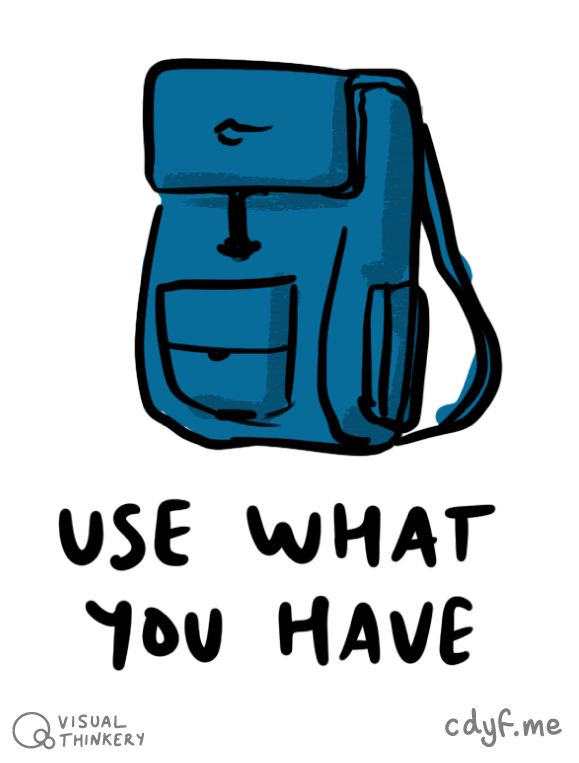
Figure 27.4: Use whatever resources you have at your disposal rather than thinking about the resources you don’t have. Use what you have by Visual Thinkery is licensed under CC-BY-ND
This rule is borrowed from software engineer Greg Wilson @gvwilson in figure 27.5, who probably adapted it from a quote frequently misattributed to Theodore Roosevelt (Brewton 2014).
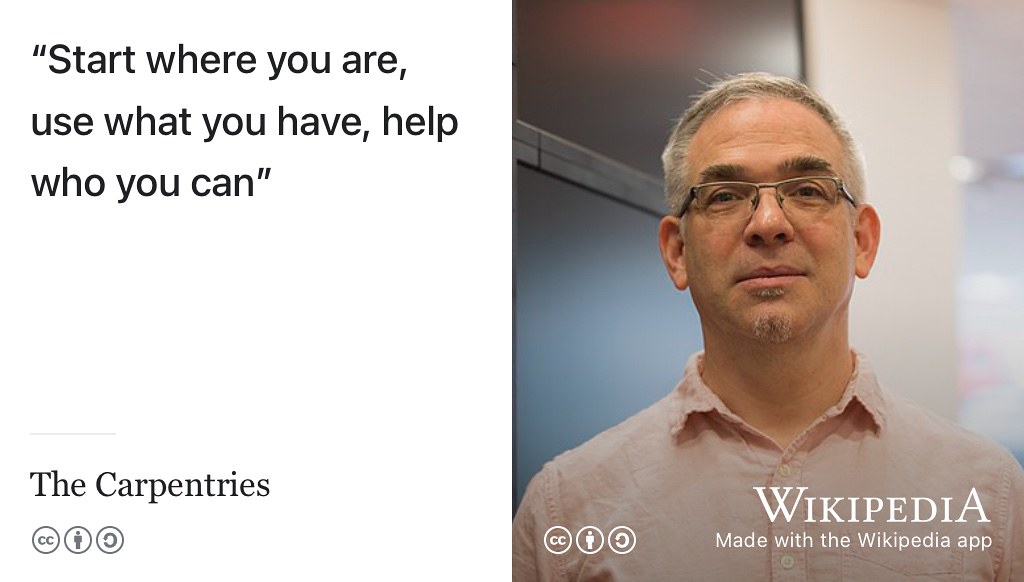
Figure 27.5: “Start where you are, use what you have, help who you can.” —Greg Wilson at third-bit.com and software-carpentry.org. CC BY Portrait of Greg Wilson at The Carpentries via Wikimedia Commons w.wiki/3a6V adapted using the Wikipedia App.
Getting a job offer is competitive and can be cut-throat. You might find yourself falling into poor habits of mind:
- “If I had a better degree from a different university, I’d be more successful…” see section 1.6
- “If I had more experience, more voluntary work, more internships, I’d stand a better chance…” see section 5.3
- “If I’d done more projects and extra-curricular activities…” etc see section 8.7.5
- “If I’d got better grades at school and Uni…” see section 24.2
- “If only I’d worked harder…” see 2.4.1
- “If I was more confident at speaking and interviews … ” see chapter 13 on Speaking your future
- “If I’d been to a different school, I could be more successful…” see the 93percent.club (Nye 2021; Verkaik 2021)
This is all the usual dialogue you can expect from your inner critic:
- Coulda
- Woulda
- Shoulda
Acknowledge these thoughts, see section 3.4, then try distance yourself from them. Start from where you are, use whatever you have and help who you can.
27.4 Grow your networks
Grow your networks, make use of all the contacts you have and foster new connections where you can. Improve the connections you already have by spending time talking to people and hearing what they have to say. People can help you, especially those you’re not particularly close to, see figure 27.6
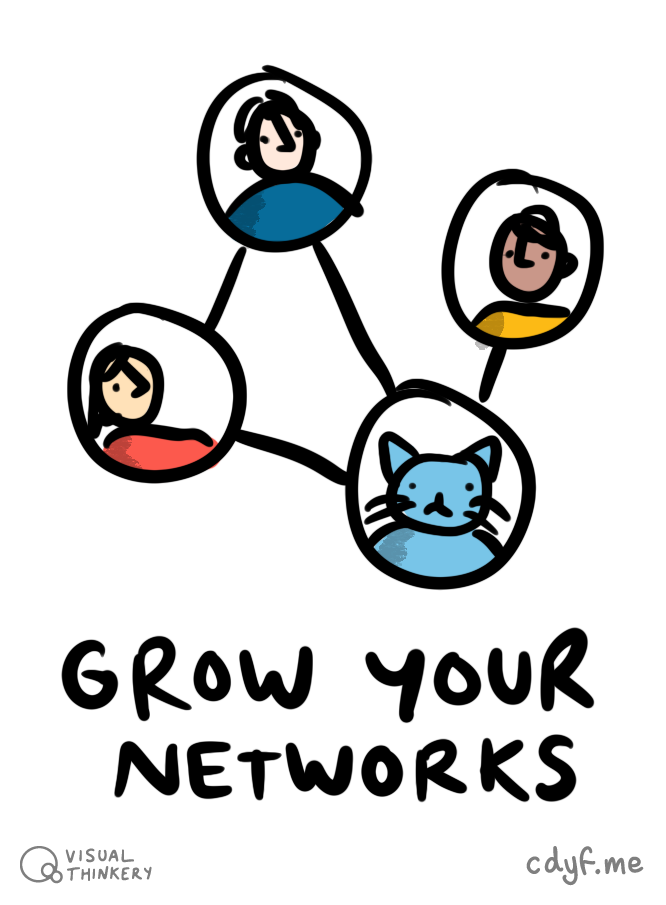
Figure 27.6: Grow and use your networks, both the strong ties and the weak ties described in section 11.2.5. Traversing your (personal) graph will help you find work. Grow your network by Visual Thinkery is licensed under CC-BY-ND
Remember that the weaker ties in your network (see section 11.2.5) may be more important than your stronger ties, especially when it comes to finding jobs. It’s not (just) what you know, but who you know.
27.5 Always make new mistakes
You can classify your mistakes and failures into two categories:
- Productive mistakes: those you learnt from
- Unproductive mistakes: those you didn’t learn anything from (and risk repeating)
Mistakes and failure are inevitable in life, but productive mistakes are going to help you much more that unproductive ones (Petroski 1985). That doesn’t just mean you should “fail fast, fail often” (Babineaux 2013) or “move fast and break things”, but to consciously learn from any mistakes you make so that you don’t repeat them. One way to turn unproductive mistakes into productive ones is deliberately and consciously reflect on why you made them. This is part of the growth mindset we discussed in chapter 3.
In a growth mindset, mistakes can be good, but the fear of making them is not. You are more likely to take more chances when you’re unafraid to fail, and this will improve your chances of success. (Swartz 2012) As the musician Andrew Weatherall was fond of saying: fail me may, sail we must, see figure 27.7.
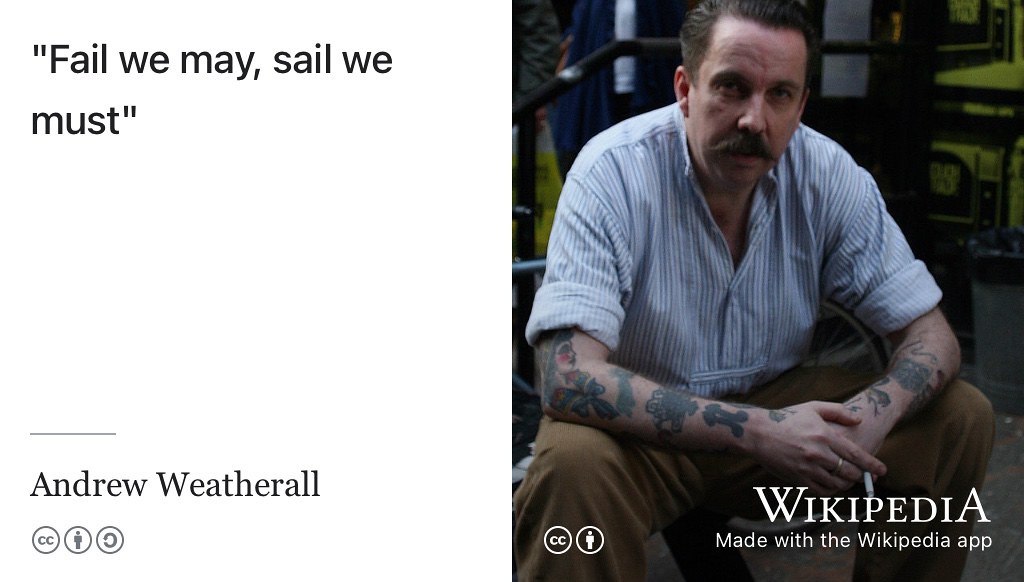
Figure 27.7: “Fail we may, sail we must”. (Weatherall 2009; Murray 2021) Is it failing or sailing that you are most afraid of? Portrait of Andrew Weatherall by Spencer Hickman on Wikimedia Commons w.wiki/3Ag5 adapted using the Wikipedia app ⛵️
Many education systems around the world don’t teach people enough about how to fail, because they put too much emphasis on success (as measured by grades and rewards) rather than progress, learning and happiness. (Lahey 2016; Kohn 2018) So as the angel investor Esther Dyson once said, “Always make new mistakes”, see figure 27.8
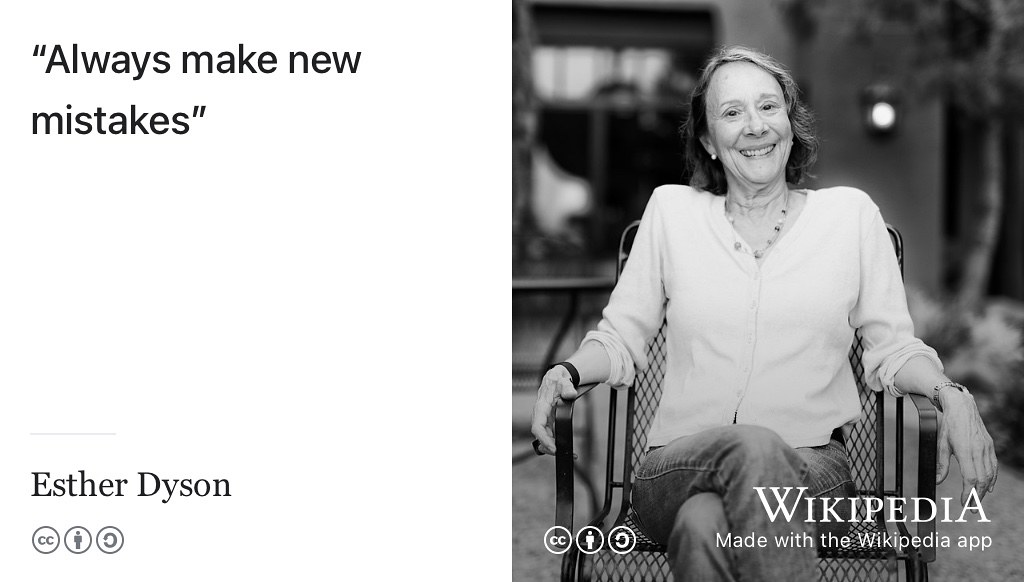
Figure 27.8: Mistakes are inevitable in life, so there’s no shame in making them especially if they are new. Making new mistakes can be a form of productive failure that you learn from rather than a source of unproductive failure that you repeat (old mistakes). Portrait of Esther Dyson by Christopher Michel (CC BY-SA) via Wikimedia commons w.wiki/3TEY adapted using the Wikipedia App.
So:
- If you’ve got some harsh feedback on your CV, how can you make less buggy in the future?
- If you’ve applied to lots of companies and not even had a reply yet, how can you improve your job search strategy?
- If you’ve neglected to develop interests and projects outside of work, how can you rebalance?
- If you crashed and burned in an interview, how can you use the experience to do better next time?
- If you failed to get the promotion you thought you deserved, what will you do differently in the future
27.6 Help and thank who you can
There are good reasons to be grateful, showing gratitude doesn’t just help other people, it helps you too see figure 27.9
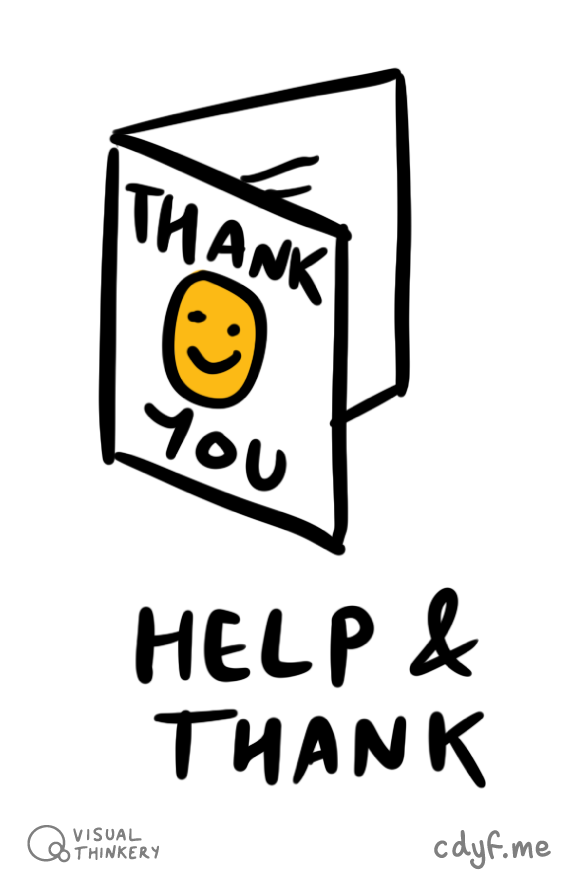
Figure 27.9: Help and thank who you can. Help by Visual Thinkery is licensed under CC-BY-ND
Join a team by helping someone, be a team player, help others, thank others for their help. Connect with your peers, its a key way to learn as described in section 2.2 and a foundation for making you feel like you belong at University. (Jackson, Capper, and Blake 2022)
27.7 Look beyond the obvious
Be flexible in your approach. Don’t just target big employers that you’ve heard of, there are plenty of startups and smaller organisations you’ve never heard of who have lots to offer, see figure 27.10.
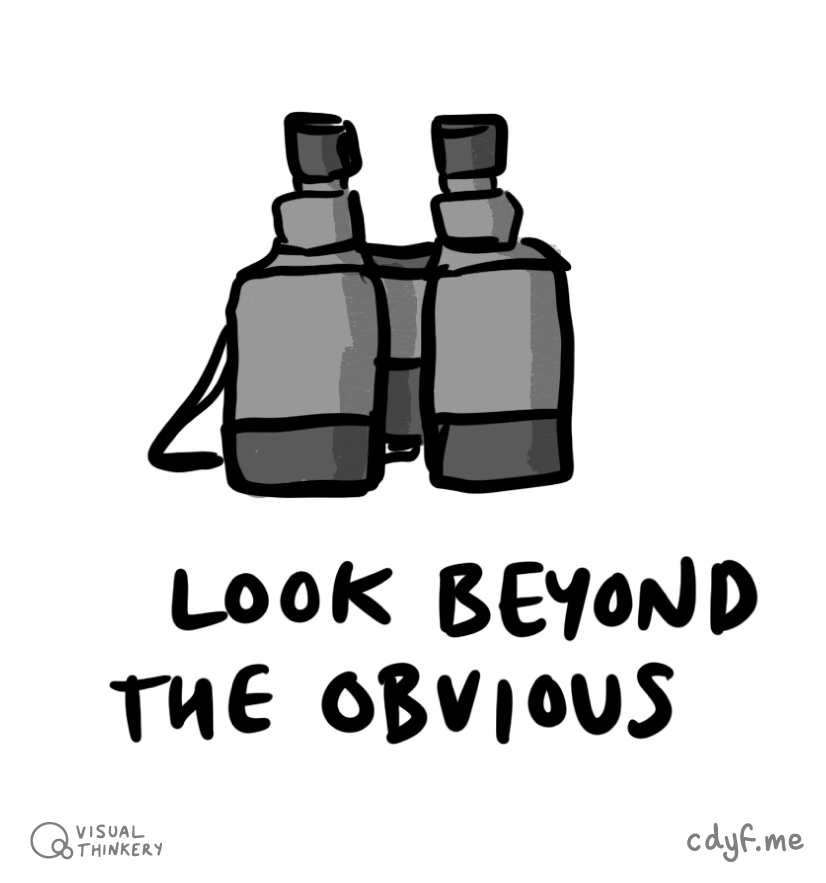
Figure 27.10: Look beyond the obvious, don’t restrict your job search to employers everyone has heard of as there are many more opportunities on offer. Binoculars by Visual Thinkery is licensed under CC-BY-ND
It’s not just London (see chapter 12), and other big cities. Look beyond graduate schemes, look beyond graduate jobs. Broaden your horizons and your job search, see chapter 6.
You are not just a techie, either, so you don’t have to be a code monkey, unless you want to be.
27.8 Stay in school
Part of what you learn during your education is how to learn. But your learning shouldn’t finish when you leave University, see figure 27.11 the discussion of life-long learning in chapter 24.

Figure 27.11: Stay in school because learning is a lifelong process, a while loop in which you continuously develop new skills and knowledge. Stay in school sketch by Visual Thinkery is licensed under CC-BY-ND
Computer science is a young and rapidly changing discipline which means you can not afford to be left behind. Never stop learning, see chapter 24. According to the psychologist Kurt Lewin, there is nothing more practical than a good theory (Lewin 1951), so you’ll need to keep learning the theory and the practice of computing shown in figure 27.12.
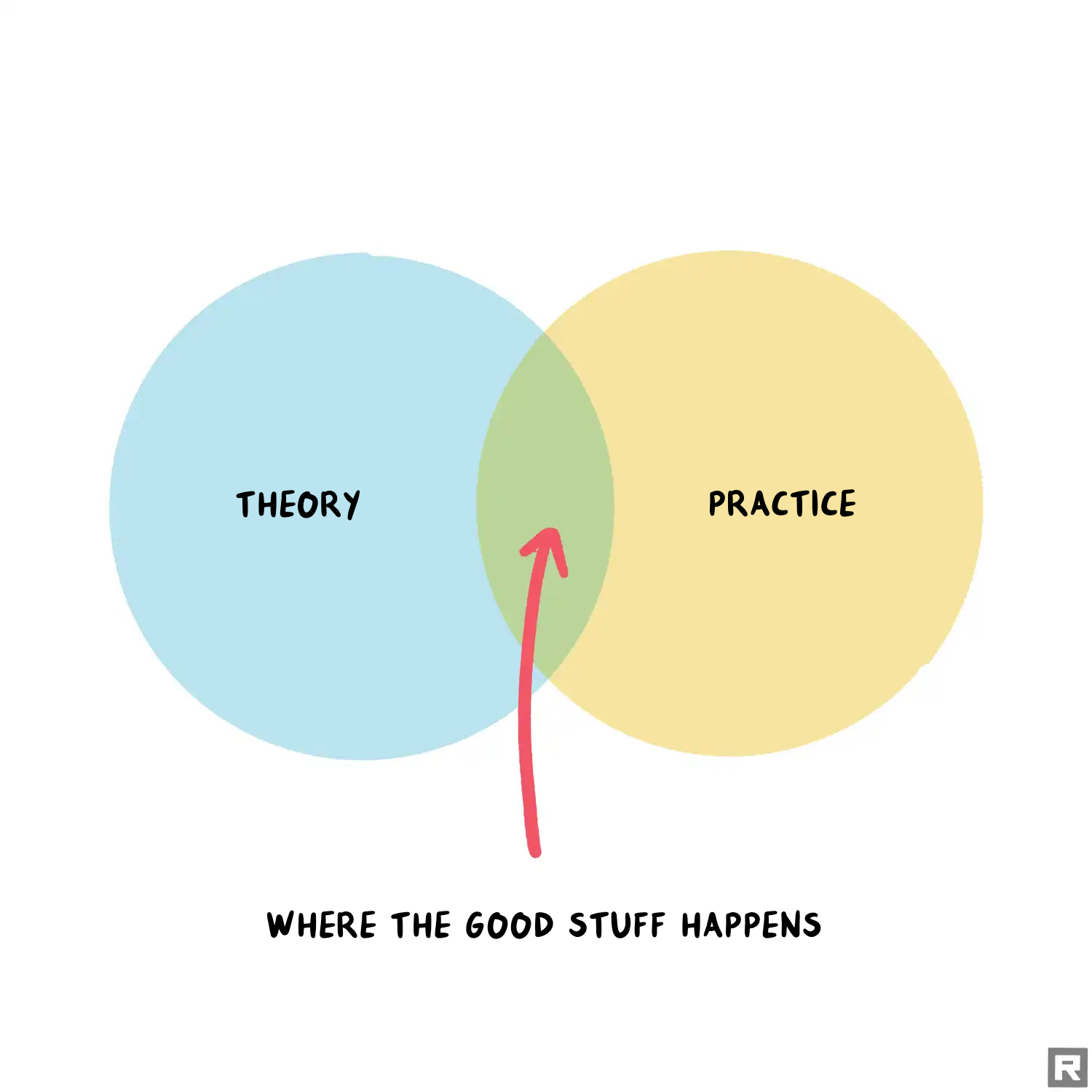
Figure 27.12: There is nothing more practical than a good theory and there is nothing as theoretical as good practice. Both theory and practice are an essential part of computing. The good stuff often happens where theory and practice overlap, so never stop learning. Good stuff by Visual Thinkery is licensed under CC BY-SA, remixed by Yours Truly. Make your own at remixer.visualthinkery.com
So “stay in school” doesn’t mean never leave University, but never stop learning.
27.9 Step outside your comfort zone
Research has shown that we often to learn more when we are uncomfortable. You will often learn more when you step outside your comfort zone and reach for things that push your limits. Failing to do so can be costly. (Kamoun 2024) Sometimes when you think you are learning you aren’t learning anything at all. Learning is an active process that requires you to do things rather than just being a passive observer or consumer. (Deslauriers et al. 2019; Barshay 2022)
Am I being insensitive asking people to step outside their comfort zone when we’ve all be stretched beyond breaking point during COVID-19, climate change, endless conflicts and global economic turmoil? We’re all going to need to continue to step outside of our respective comfort zones in order to meet the challenges we face around the world, see figure 27.13.
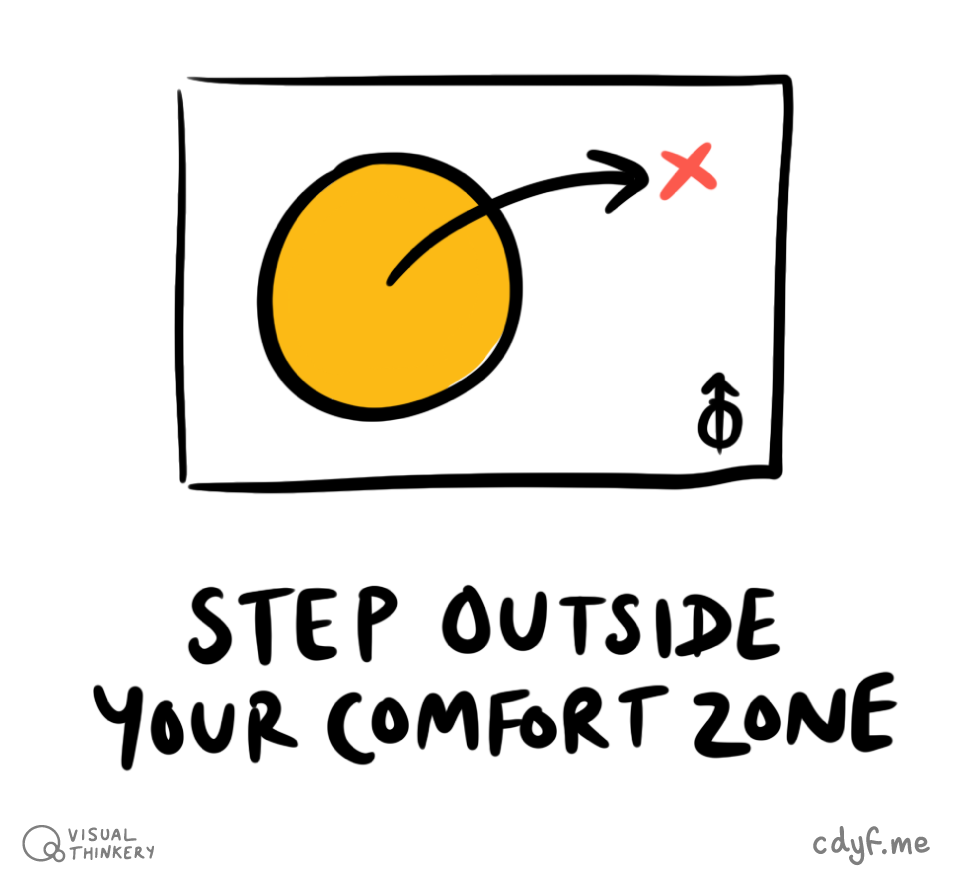
Figure 27.13: You learn and grow more when you step outside your comfort zone. Comfort zone sketch by Visual Thinkery is licensed under CC-BY-ND
Leaving the happy cozy comforts that you are familiar with will take courage, but that’s often when you learn most, and might even lead to even greater achievements, see figure 27.14.
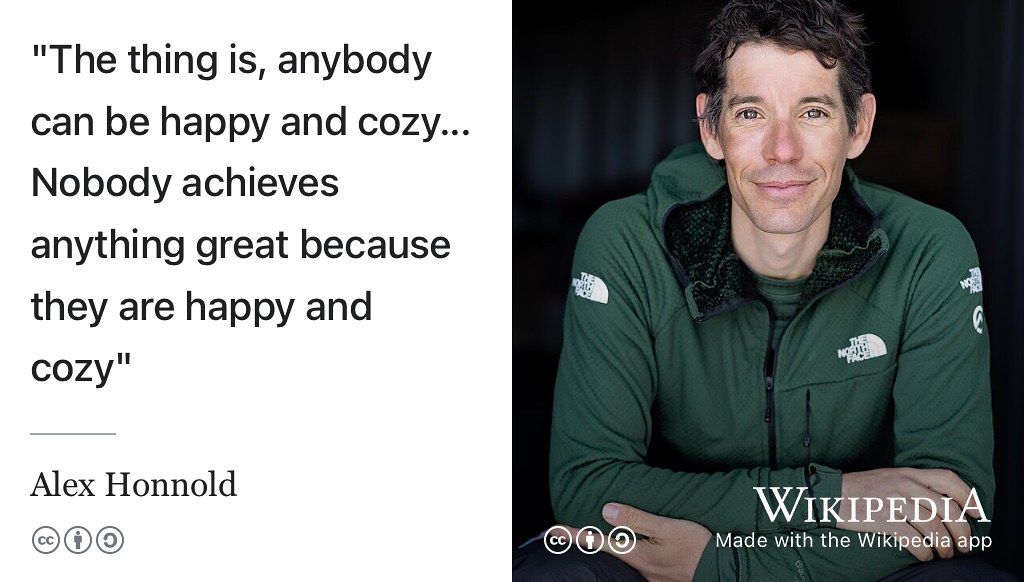
Figure 27.14: You don’t need to climb El Capitan solo (without a rope), but you are likely to benefit from stepping outside your comfort zone once in a while. According to the climber Alex Honnold in Free Solo: “The thing is, anybody can be happy and cozy … Nobody achieves anything great because they are happy and cozy.” (Vasarhelyi and Chin 2018) CC BY-SA portrait of Alex Honnold by Cmichel67 via Wikimedia commons w.wiki/9mAj adapted using the Wikipedia App 🧗♀️
While Alex’s opinion that “nobody” achieves “anything great” because they are happy and cozy is debateable, we can’t deny that stepping outside your comfort zone every now and then will help you learn, grow and (hopefully) achieve more.
27.10 Don’t give up
Job hunting can be hard. Job hunting can be stressful. Job hunting can be time consuming. Some employers will waste your valuable time, see section 11.4.2. Some employers will reject you but try not to take it personally, see 11.4.10. Job hunting may affect your mental health, see chapter 3. The important thing is to not give up, see figure 27.15. Try to make any failure productive, rather than unproductive, see section 27.5.
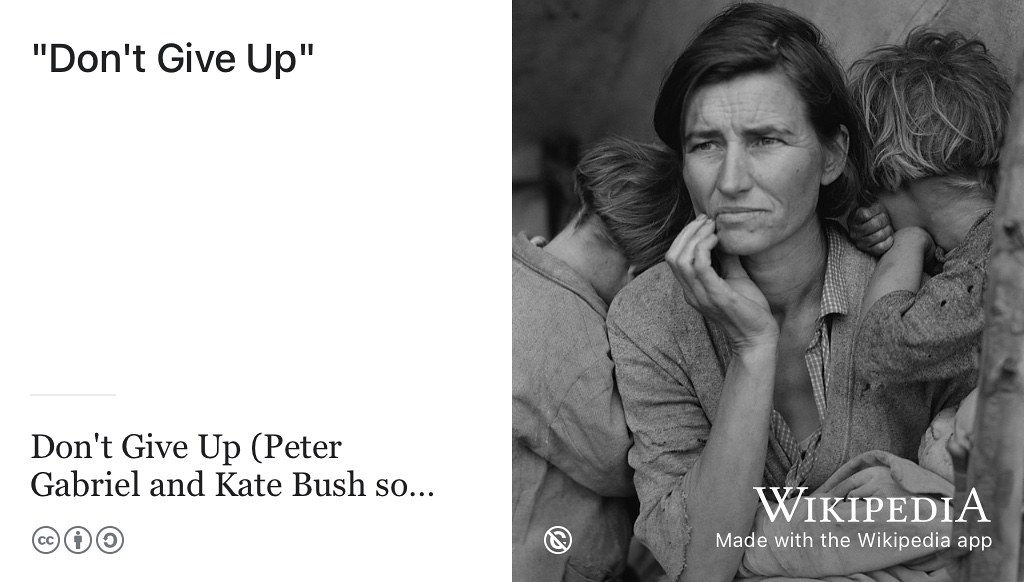
Figure 27.15: You were taught to fight, taught to win, perhaps you never thought you could fail? Don’t give up, because you have friends. Don’t give up, you’re not beaten yet. Don’t give up, I know you can make it good. (Gabriel and Bush 1986) Public domain portrait of a Migrant Mother by Dorothea Lange via Wikimedia Commons w.wiki/3cRg which inspired the song Don’t Give Up by Peter Gabriel and Kate Bush. (Gabriel and Bush 1986)
27.11 Summarising Your Future
Too long, didn’t read (TL;DR)? Here’s a summary:
In this chapter we’ve looked at ten simple rules for coding your future, summarised in figure 27.16.
Your future is bright, your future needs ruling. Ruling your future, will help you deploy your future. Deploying your future is coding your future.

Figure 27.16: Ten Simple rules for coding your future. Know who you are, look after yourself, use what you have, grow your networks, always make new mistakes, help and thank, look beyond the obvious, stay in school, step outside your comfort zone and (most importantly) don’t give up! Figure by Visual Thinkery is licensed under CC-BY-ND
In the next section, chapter 28 we’ll meet some coders who are ruling (and coding) their futures.